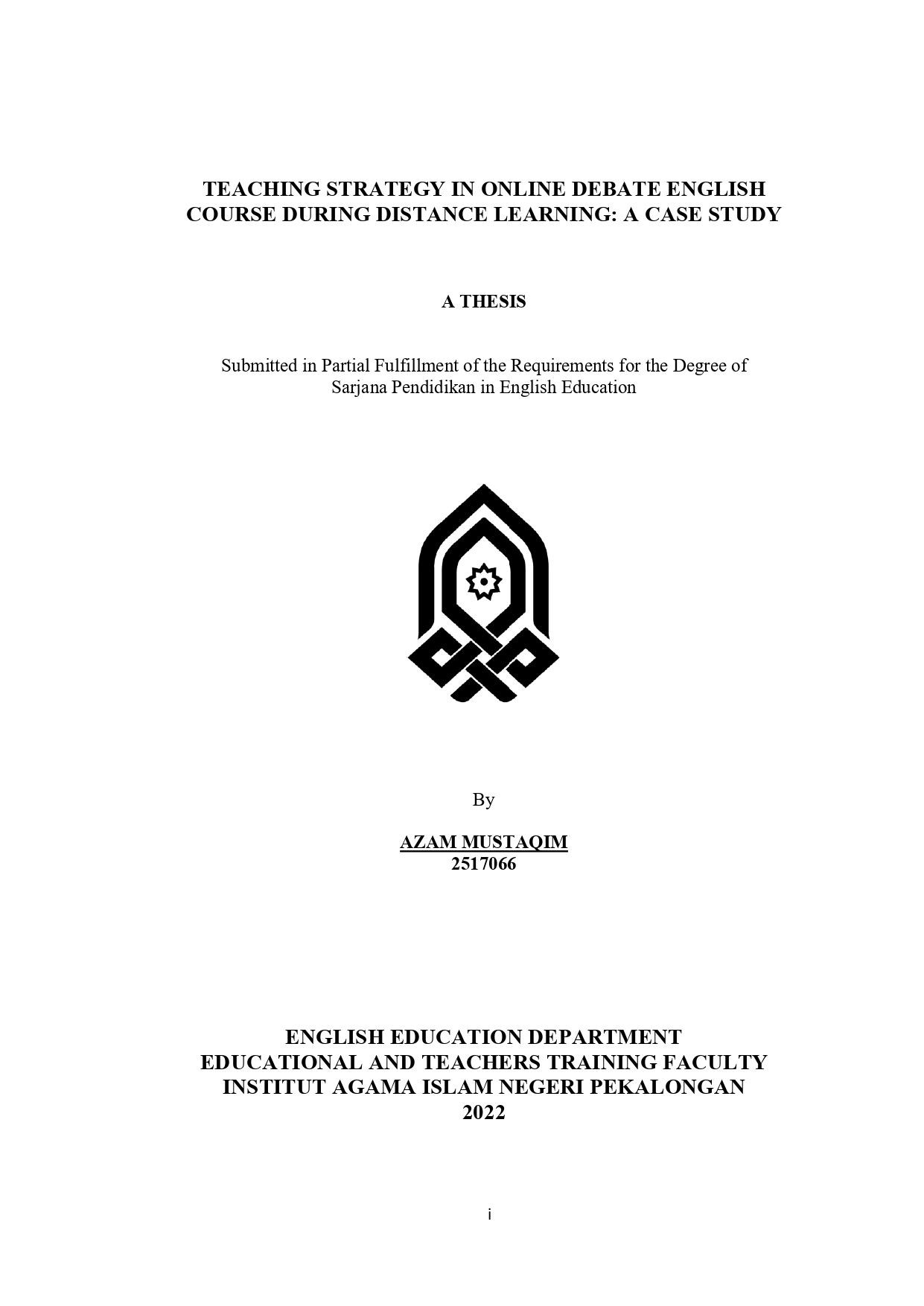
SKRIPSI TADRIS BAHASA INGGRIS
Teaching Strategy in Online Debate English Course During Distance Learning : A Case Study
This reflective case study is based on a lecturer strategy in teaching online English Debate Course as an online instructional approach. Through direct interviews with one of the lecturers on the Engish Debate Course and five undergraduate students as participants, the researchers combined data sources to analyze several results of the strategies applied in teaching, including the lecturer's experience in teaching the English Debate Course. This thesis contributes to the research field of instructional techniques (especially debate), as well as online distance education. This type of research was field research with qualitative approach. In this study the data collection took observation, interview and documentation based transcript record. there are three ways to analyze the data that used by researcher : Data Reduction, Data Display, and Conclusion Drawing/verification. The result of this study show that lecturers has mild obstacles, but she remains keep an efforts to maintain the rhythm of communication with students who are members of the online class. Giving time is proven to help keep students active, thus the learning process resembles face-to-face learning.
Keyword : English Debate Course, Teaching Strategy, Distance learning.
REFERENCES
Miles, M. B. and Huberman.(1994). Qualitative Data Analysis. London: SAGE Publication
Brown, C. (2017). Advantages and Disadvantages of Distance Learning. Retrieved from https//:www.eztalks.com/elearning/advantages-and-disanvatages-of distance-learning.html
Freely J,Austin and David L. Steinberg. 2009. Argumentation and Debate : Critical Thingking for Reasoned Decision Making, Boston: Wadsworth Cegage Learning
Bilfaqih, Yusuf. (2015). EsesnsiPengembanganPembelajaranDaring.Yogyakarta : Deepublis.
Thornbury, S. and Slade, D. (2006). Conversation: From Description to Pedagogy. Cambridge: Cambridge University Press.
Dhawan, S. (2020). Online Learning: A Panacea in the Time of COVID-19 Crisis. Journal of Educational Technology Systems, 49(1) DOI: 10.1177/0047239520934018 journals.sagepub.com/home/ets.
Moeloeng, Lexy. 2013. MetodologiPenelitianKualitatif. Bandung:PT. RemajaRosdakarya.
Slameto. 2010. Belajar dan Faktor-Faktor yang Mempengaruhi. Jakarta: RinekaCipta.
Sugiyono. (2016). MetodologiPenelitianKuantitaif, Kualitatif, dan RD. Bandung : Alfabeta.
Nicholas Corder (2002). Learning to Teach Adult, London: Routledge Farmer.
Zhang, D., Zhaou, L., & Nunmaker, J.F. (2004) Can e-learning replace classroom learning? Communication of the ACM. https://doi.org/10.1145/986213.98621
Haidir, & Salim. (2012). Strategi Pembelajaran. Medan: Perdana Publishing.
Creswell, J. W. (2014). Research Design Qualitative, Quantitative, and Mixed Methods
Approaches (Fourth Edition ed.). America: SAGE publications.
Sanjaya, Wina. 2017. Strategi pembelajaran berorientasi standar proses pendidikan.Jakarta : Kencana Prenada Media Group.
Kunandar. 2017. Guru Professional : Implementasi Kurikulum Tingkat Satuan, Pendidikan (KTSP) dan Sukses dalam Sertifikasi Guru, Jakarta : Rajagrafindo Persada.
Yule, George dan Brown.2010. Discourse Analysis. Jakarta : Gramedia.
Orlich, D.C. et al,. 2010 Teaching Strategies a guide to effective instruction, Boston : Houghton Mifflin Company.
Harmer, J. 2007. Teaching Speaking . In How To Teach English. Oxford :Pearson Longman
Richards, J. C. 2015. Speaking ; In key issues in language teacing (pp 406-441). United Kingdom: Cambridge : Cambridge University Press.
Issac, Jerin C. 2010 Methods and Strategy of Teaching : an Overview, Pondichery. University Press
Lustigova, L. 2011. Speak Your Mind: simplified Debates as A Learning Tool at The University Level. Journal on Efficiency and Responsibility in Education and Science; Vol.4,No.1
Ketersediaan
| 23SK2325033.00 | SK TI 23.033 AZA t | My Library (Lantai 3. Local Content) | Tersedia |
Informasi Detail
- Judul Seri
-
-
- No. Panggil
-
SK TI 23.033 AZA t
- Penerbit
- Pekalongan : Jurusan S-1 Tadris Bahasa Inggris FTIK UIN K.H. Abdurrahman Wahid Pekalongan., 2022
- Deskripsi Fisik
-
xi, 36 hlm., 30 cm; Bibliografi: 37-39
- Bahasa
-
Inggris
- ISBN/ISSN
-
-
- Klasifikasi
-
371. 35
- Tipe Isi
-
-
- Tipe Media
-
-
- Tipe Pembawa
-
-
- Edisi
-
-
- Subjek
- Info Detail Spesifik
-
-
- Pernyataan Tanggungjawab
-
Azam Mustaqim (2517066)
Versi lain/terkait
Tidak tersedia versi lain
Lampiran Berkas
Komentar
Anda harus login sebelum memberikan komentar
 Karya Umum
Karya Umum  Filsafat
Filsafat  Agama
Agama  Ilmu-ilmu Sosial
Ilmu-ilmu Sosial  Bahasa
Bahasa  Ilmu-ilmu Murni
Ilmu-ilmu Murni  Ilmu-ilmu Terapan
Ilmu-ilmu Terapan  Kesenian, Hiburan, dan Olahraga
Kesenian, Hiburan, dan Olahraga  Kesusastraan
Kesusastraan  Geografi dan Sejarah
Geografi dan Sejarah